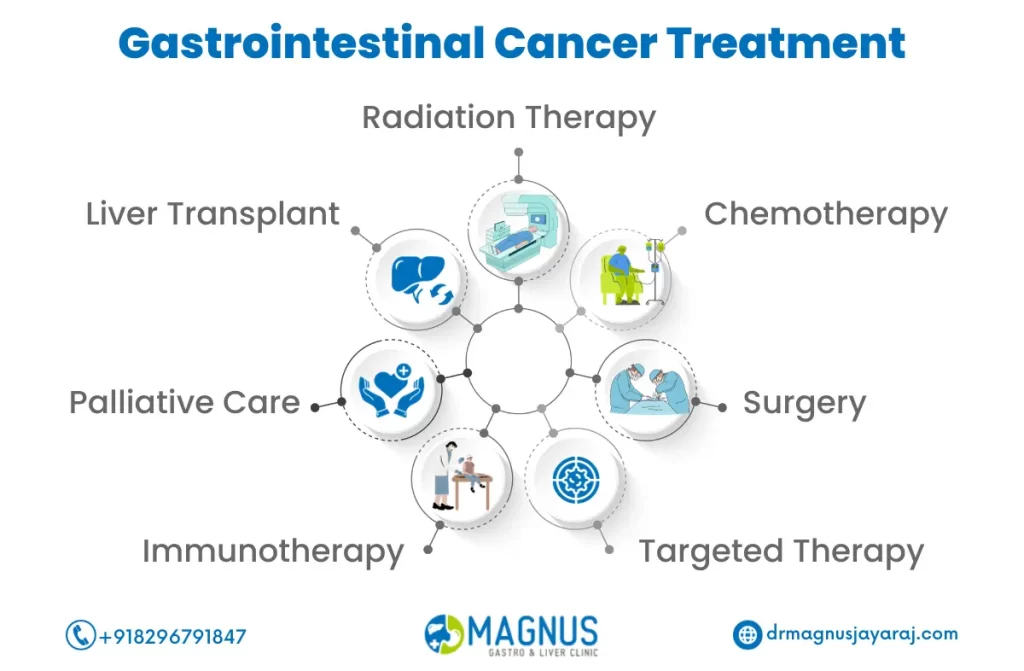Gastrointestinal cancer is a group of cancers that affect the digestive system, including the esophagus, stomach, liver, pancreas treatment, and intestines. The diagnosis of gastrointestinal cancer can be daunting, but there is hope on the horizon. Recent advancements in gastrointestinal cancer treatment have brought new possibilities for patients, offering more effective and less invasive treatment options.
This progress underscores the importance of seeking specialized care and exploring the latest approaches to gastrointestinal cancer treatment in Chennai, where medical professionals are leveraging cutting-edge techniques to improve outcomes for individuals facing these challenging diagnoses. In this blog post, we will explore these advancements, providing insights into the evolving landscape of gastrointestinal cancer treatment.
Precision Medicine and Targeted Therapies
One of the most significant breakthroughs in gastrointestinal cancer treatment in Chennai is the emergence of precision medicine and targeted therapies. Rather than a one-size-fits-all approach, these treatments are tailored to the specific genetic and molecular characteristics of a patient’s cancer.
Targeted therapies work by identifying specific genetic mutations or proteins that are driving the growth of cancer cells. Once these targets are identified, drugs are developed to inhibit or block their activity. This approach not only increases the effectiveness of treatment but also minimizes the side effects that are often associated with traditional chemotherapy.

Immunotherapy in Gastrointestinal Cancer
Immunotherapy has been a game-changer in the field of cancer treatment, including gastrointestinal cancers. These treatments harness the body’s immune system to identify and attack cancer cells. In the case of gastrointestinal cancers, immunotherapy has shown promise in treating cancers such as colorectal and liver cancer.
Checkpoint inhibitors, a type of immunotherapy, have been approved for certain gastrointestinal cancers, offering new hope for patients with advanced stages of the disease. Research continues in this exciting field to expand the use of immunotherapy in gastrointestinal cancer treatment in Chennai.
Signs And Symptoms Of Gastric Cancer
Gastric cancer, also known as stomach cancer, often presents with subtle symptoms in its early stages, which can make it challenging to detect. However, as the disease progresses, certain signs and symptoms may become more apparent:
- Persistent abdominal discomfort or pain, particularly in the upper abdomen.
- unexplained weight loss without nutrition or exercise modifications.
- Persistent nausea or vomiting, which may be accompanied by blood.
- Difficulty swallowing, known as dysphagia.
- Feeling full or bloated after eating small amounts of food, known as early satiety.
- Blood in the stool, which may appear as black or tarry stools.
- Fatigue or weakness, often due to anemia caused by gastrointestinal bleeding.
If you experience any of these symptoms, especially if they persist or worsen over time, it is essential to consult a healthcare professional promptly. Early detection and treatment significantly improve the prognosis of gastric cancer.
For the best gastrointestinal cancer treatment in Chennai, trust our expert team. With state-of-the-art facilities and a multidisciplinary approach, we are dedicated to providing comprehensive care and improving patient outcomes.
Minimally Invasive Surgical Techniques
Advancements in surgical techniques have made a significant impact on the treatment of gastrointestinal cancers. Minimally invasive procedures, such as laparoscopic surgery and robotic surgery, offer several advantages over traditional open surgery.
These techniques involve smaller incisions, less blood loss, reduced pain, and faster recovery times for patients. Minimally invasive surgery is increasingly being used in the removal of tumors, especially in cases of colorectal and stomach cancer. These advancements not only improve patient outcomes but also enhance their quality of life during and after treatment.
Personalized Treatment Plans
Gastrointestinal cancer treatment in Chennai is increasingly moving toward personalized treatment plans. Oncologists are now considering a patient’s individual medical history, tumor type, and genetic profile to create a tailored treatment strategy. This approach allows for a more precise and effective treatment plan.
Additionally, multidisciplinary tumor boards consisting of specialists in gastroenterology, surgery, radiation oncology, and medical oncology collaborate to determine the best course of action for each patient. This comprehensive approach ensures that all available options are considered and that patients receive the most advanced and well-rounded care.
Gastroenterology: Gastrointestinal Cancer Treatment in Chennai
In India, particularly the field of gastroenterology in Chennai has seen remarkable progress in the diagnosis and treatment of gastrointestinal cancers. Gastroenterologists in Chennai are at the forefront of adopting these advancements, offering patients the benefits of precision medicine, targeted therapies, and minimally invasive surgical techniques.
Precision Medicine and Targeted Therapies
- Individualized Treatment: Shifts from a general approach to one tailored to the patient’s unique genetic and molecular cancer profile.
- Genetic and Molecular Targeting: Identifies specific mutations or proteins fueling cancer growth to develop effective treatment strategies.
- Development of Specialized Drugs: Creates medications designed to block or inhibit the activity of targeted cancer-driving elements.
- Enhanced Treatment Efficacy: Increases the success rate of cancer treatment by focusing on specific cellular targets.
- Reduced Side Effects: Minimizes the adverse effects commonly seen with conventional chemotherapy, improving patient quality of life.
Risk Factors
Risk factors for gastrointestinal cancer can vary depending on the specific type of cancer within the digestive system. Additionally, certain factors may influence the prognosis and treatment outcomes. When considering gastrointestinal cancer treatment in Chennai, it’s important to take into account both general risk factors associated with these cancers and the advancements in treatment options available in the region.
Risk Factors for Gastrointestinal Cancer:
- Age: The risk of gastrointestinal cancers generally increases with age.
- Family History: A family history of gastrointestinal cancers, especially in first-degree relatives, may contribute to an increased risk.
- Genetic Factors: Some gastrointestinal cancers have a hereditary component, such as certain gene mutations associated with colorectal cancer.
- Diet: A diet high in red or processed meats and low in fruits, vegetables, and fiber may be linked to an increased risk of certain gastrointestinal cancers.
- Smoking and Alcohol: Tobacco use and excessive alcohol consumption are known risk factors for various gastrointestinal cancers, including those affecting the esophagus, stomach, and liver.
- Chronic Inflammation: Conditions such as chronic gastritis, inflammatory bowel disease (IBD), and chronic pancreatitis may elevate the risk of gastrointestinal cancers.
- Obesity: Being overweight or obese is associated with an increased risk of several types of gastrointestinal cancers.
Conclusion
Advancements in gastrointestinal cancer treatment in Chennai offer new hope and improved outcomes for patients facing these challenging diseases. The evolution of precision medicine, targeted therapies, immunotherapy, and minimally invasive surgery has transformed the landscape of gastrointestinal cancer care. As research continues and technology advances, we can anticipate even more exciting developments on the horizon.
Check out best liver transplant surgeon in Chennai

